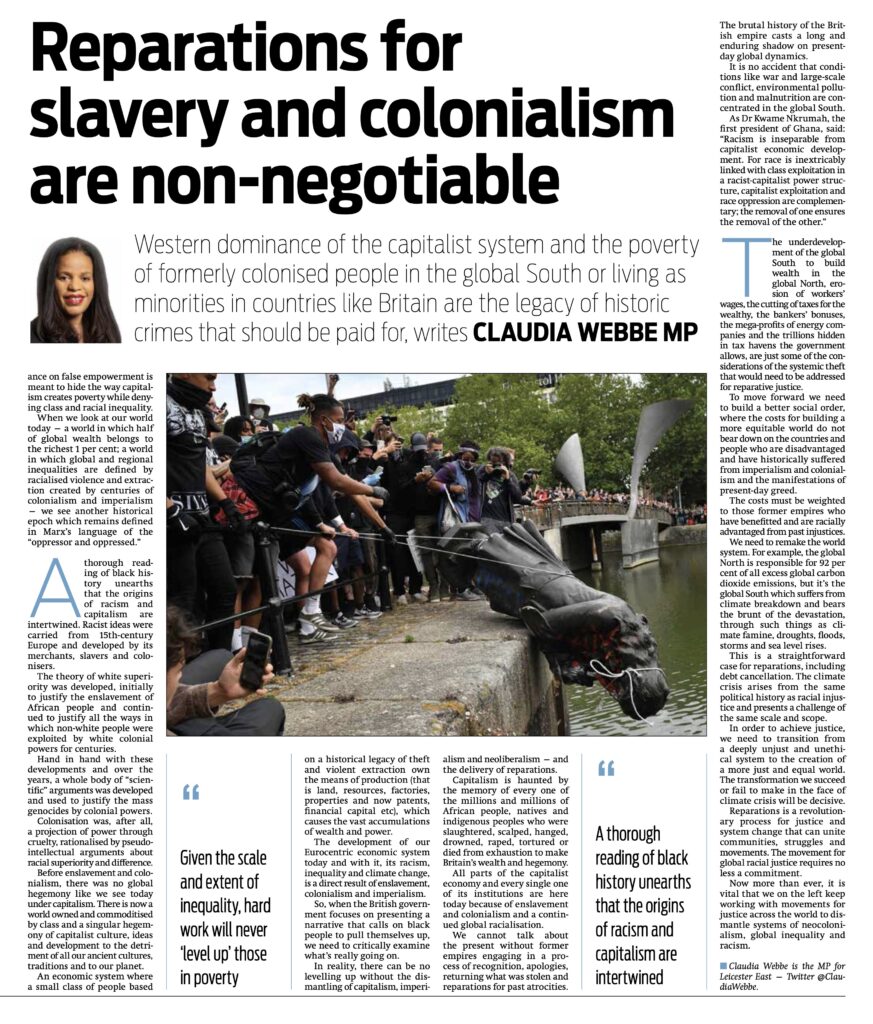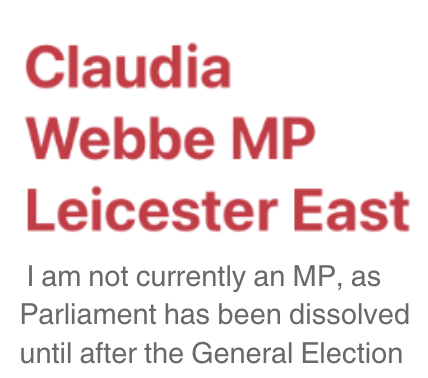
Reparations for slavery and colonialism are non-negotiable
By Claudia Webbe MP
Western dominance of the capitalist system and the poverty of formerly colonised people in the global South or living as minorities in countries like Britain are the legacy of historic crimes that can and must be paid for, writes CLAUDIA WEBBE MP
October is Black History Month, which in truth would not need to happen if we lived in a fairer, just and post-capitalist society.
A society where the curriculum taught the truth about empire; the mass enslavement, famines and genocides that built the origins of Britain’s wealth and how the system extracted wealth and exerted control and influence abroad.
The racialised murder of George Floyd, the rising awareness of the Black Lives Matter movement, decolonising education and museums, movements on university campuses, bringing down statues of slavers and imperialists and sportspeople taking the knee and many other acts of solidarity have been met with strong fascistic political and media backlash on both sides of the Atlantic.
The Conservative government’s response was nothing short of gaslighting. They published a report in 2021, arguing that structural racism does not exist.
Runnymede, a charitable race equality think tank, said that the people involved in this commission “had no interest in genuinely discussing racism,” adding: “The least the commission could have done is acknowledge the very real suffering of black and minority ethnic communities here in the UK.”
It continues: “The very suggestion that government evidence confirms that institutional racism does not exist is frankly disturbing.”
According to the Joseph Rowntree Foundation, 11 per cent of white people in work are in poverty, less than half those from African, Caribbean, Asian and other racialised groups at 24 per cent.
Rather than recognise the racial disparities, the government’s report seeks to pit working-class communities against each other.
In reality, in the sixth-richest country in the world, any level of poverty in is abhorrent — especially when we consider that personal wealth in the country is now over £15 trillion, which is heavily skewed at the top.
The richest 20 per cent in the country have 63 per cent of this wealth, while the lowest 20 per cent have 0.6 per cent of this wealth. This general trend of wealth distribution has never altered and is caused by policies that favour Britain’s ultra-rich.
The government’s own report obfuscates deep structural problems with our capitalist economy. The government message is to focus on growth, individualism and competition as solutions. Its message is clear: work harder, get ahead and “level up” yourself — and that no barriers, constraints or contradictions exist.
Given the scale and extent of inequality, hard work will never “level up” those in poverty. The government’s reliance on false empowerment is meant to hide the way capitalism creates poverty while denying class and racial inequality.
When we look at our world today — a world in which half of global wealth belongs to the richest 1 per cent; a world in which global and regional inequalities are defined by racialised violence and extraction created by centuries of colonialism and imperialism — we see another historical epoch which remains defined in Marx’s language of the “oppressor and oppressed.”
A thorough reading of black history unearths that the origins of racism and capitalism are intertwined. Racist ideas were carried from 15th-century Europe and developed by its merchants, slavers and colonisers.
The theory of white superiority was developed, initially to justify the enslavement of African people and continued to justify all the ways in which non-white people were exploited by white colonial powers for centuries.
Hand in hand with these developments and over the years, a whole body of “scientific” arguments was developed and used to justify the mass genocides by colonial powers.
Colonisation was, after all, a projection of power through cruelty, rationalised by pseudo-intellectual arguments about racial superiority and difference.
Before enslavement and colonialism, there was no global hegemony like we see today under capitalism. There is now a world owned and commoditised by class and a singular hegemony of capitalist culture, ideas and development to the detriment of all our ancient cultures, traditions and to our planet.
An economic system where a small class of people based on a historical legacy of theft and violent extraction own the means of production (that is land, resources, factories, properties and now patents, financial capital etc), which causes the vast accumulations of wealth and power.
The development of our Eurocentric economic system today and with it, its racism, inequality and climate change, is a direct result of enslavement, colonialism and imperialism.
So, when the British government focuses on presenting a narrative that calls on black people to pull themselves up, we need to critically examine what’s really going on.
In reality, there can be no levelling up without the dismantling of capitalism, imperialism and neoliberalism — and the delivery of reparations.
Capitalism is haunted by the memory of every one of the millions and millions of African people, natives and indigenous peoples who were slaughtered, scalped, hanged, drowned, raped, tortured or died from exhaustion to make Britain’s wealth and hegemony.
All parts of the capitalist economy and every single one of its institutions are here today because of enslavement and colonialism and a continued global racialisation.
We cannot talk about the present without former empires engaging in a process of recognition, apologies, returning what was stolen and reparations for past atrocities. The brutal history of the British empire casts a long and enduring shadow on present-day global dynamics.
It is no accident that conditions like war and large-scale conflict, environmental pollution and malnutrition are concentrated in the global South.
As Dr Kwame Nkrumah, the first president of Ghana, said: “Racism is inseparable from capitalist economic development. For race is inextricably linked with class exploitation in a racist-capitalist power structure, capitalist exploitation and race oppression are complementary; the removal of one ensures the removal of the other.”
The underdevelopment of the global South to build wealth in the global North, erosion of workers’ wages, the cutting of taxes for the wealthy, the bankers’ bonuses, the mega-profits of energy companies and the trillions hidden in tax havens the government allows, are just some of the considerations of the systemic theft that would need to be addressed for reparative justice.
To move forward we need to build a better social order, where the costs for building a more equitable world do not bear down on the countries and people who are disadvantaged and have historically suffered from imperialism and colonialism and the manifestations of present-day greed.
The costs must be weighted to those former empires who have benefitted and are racially advantaged from past injustices.
We need to remake the world system. For example, the global North is responsible for 92 per cent of all excess global carbon dioxide emissions, but it’s the global South which suffers from climate breakdown and bears the brunt of the devastation, through such things as climate famine, droughts, floods, storms and sea level rises.
This is a straightforward case for reparations, including debt cancellation. The climate crisis arises from the same political history as racial injustice and presents a challenge of the same scale and scope.
In order to achieve justice, we need to transition from a deeply unjust and unethical system to the creation of a more just and equal world. The transformation we succeed or fail to make in the face of climate crisis will be decisive.
Reparations is a revolutionary process for justice and system change that can unite communities, struggles and movements. The movement for global racial justice requires no less a commitment.
Now more than ever, it is vital that we on the left keep working with movements for justice across the world to dismantle systems of neocolonialism, global inequality and racism.
Claudia Webbe MP is the member of Parliament for Leicester East. You can follow her at www.facebook.com/claudiaforLE and twitter.com/ClaudiaWebbe


